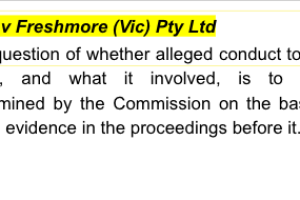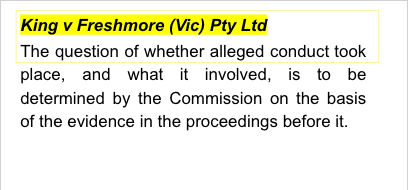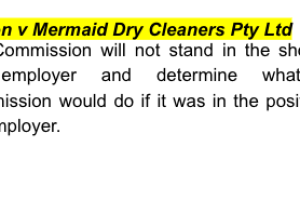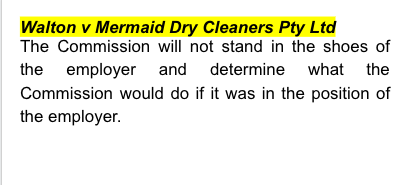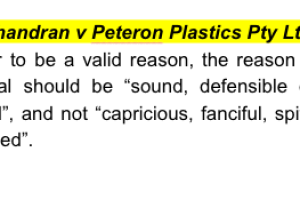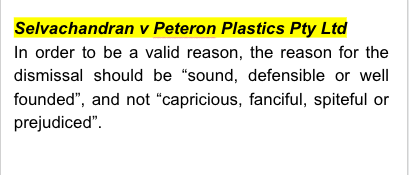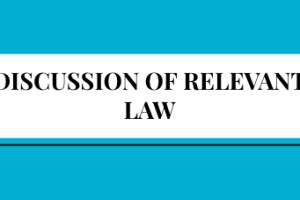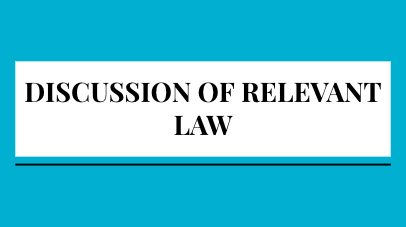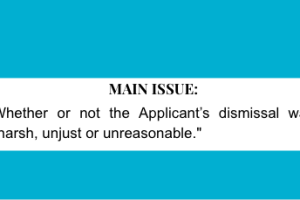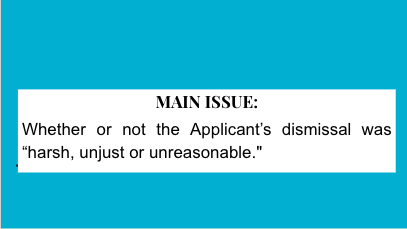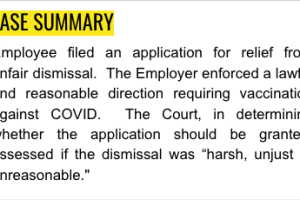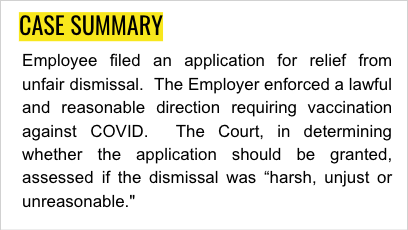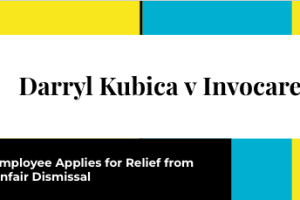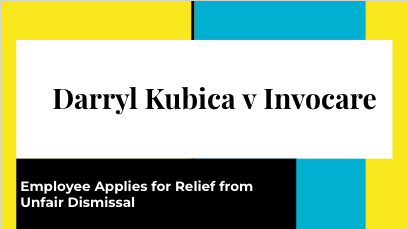Employee Applies for Relief from Unfair Dismissal

Darryl Kubica v InvoCare Australia Pty Ltd [2022] FWC 1439 (21 July 2022)

Employee filed an application for relief from unfair dismissal. The Employer enforced a lawful and reasonable direction requiring vaccination against COVID. The Court, in determining whether the application should be granted, assessed if the dismissal was “harsh, unjust or unreasonable."

Facts:
The Applicant commenced employment with the Respondent on 21 March 2005. The Applicant was employed as a Grade 3 worker under the Invocare Australia Pty Limited NSW Funerals Industry Enterprise Agreement 2019 (enterprise agreement). The Respondent operates in the funeral industry. As of 7 October 2021 a NSW Public Health Order was released that required that all client facing employees in the funeral industry... be fully vaccinated.”
On 28 October 2021, Mr. Shane Lincoln, Regional Manager Operations of the Respondent, wrote to the Applicant (referring to a previous discussion) and stated that in accordance with an NSW state directive, the Respondent employer requires “that all staff are fully vaccinated to attend any size of funeral.” Mr. Lincoln further noted that if an employee is “not able to provide evidence to [the Respondent] of their status (or you do not otherwise meet the COVID-19 vaccination requirements imposed by the Chief Health Officer), we will have no choice but to refuse you entry to our sites. Where that occurs and there are no reasonable alternative arrangements available, we may, unfortunately, have to explore alternatives of leave or review your ongoing employment with Invocare.”
Ms. Bayliss advised the Applicant that leave options may be available to him and acknowledged that the Applicant had extended his annual leave until 26 November 2021. The Applicant was also advised that the Respondent intended to introduce a Covid-19 Policy which would take effect on 27 January 2022. The Applicant was informed that if he chose not to have one vaccination dose by 6 December 2021, and be fully vaccinated by 14 January 2022, his ongoing employment would be in jeopardy.
The Applicant said that the Respondent’s “Failure to produce the written Law mandating this forced medical procedure, within three days of receiving this letter, shall be taken to be unwarranted coercion and workplace harassment for which substantial compensation may be due. Undertaking the medical procedure as a condition to avoid work termination will not release, or absolve, you of the above-numbered points and may be deemed a trespass without a written coram judice warrant.” The Respondent replied to the Applicant in writing, explaining that whilst the Applicant’s position was respected, the Applicant would be unable to attend the Respondent’s workplace from 27 January 2022 as the Applicant was unable to perform (the inherent requirements of) his role.
On 31 January 2022, the Respondent sent the Applicant a show cause letter (Show Cause Letter) regarding his non-compliance with the Covid-19 Policy. The Respondent explained that due to this contravention, Invocare intended to terminate the Applicant’s employment. The Applicant indicated that he may adhere to the Covid-19 Policy subject to being provided with further particulars regarding the safety, effectiveness, and lawfulness of the Respondent’s Covid-19 Policy.
The Applicant was invited to attend a Microsoft Teams meeting on 7 February 2022 to discuss his responses to the Show Cause Letter, and the outcome of the show cause process. The Applicant declined this invitation and requested that all communication to him be in writing. The Applicant was terminated by letter on 9 February 2022.

Issue:
Whether or not the Applicant’s dismissal was “harsh, unjust or unreasonable."

Applicable law:
Selvachandran v Peteron Plastics Pty Ltd [1995] IRCA 333 - provides that in order to be a valid reason, the reason for the dismissal should be “sound, defensible or well founded”, and not “capricious, fanciful, spiteful or prejudiced”.

Walton v Mermaid Dry Cleaners Pty Ltd [1996] IRCA 267; (1996) 142 ALR 681 - provides that the Commission will not stand in the shoes of the employer and determine what the Commission would do if it was in the position of the employer.

Edwards v Justice Giudice (1999) 94 FCR 561; (1999) 169 ALR 89; [1999] FCA 1836 - relied upon in holding that where a dismissal relates to an employee’s conduct, the reason for dismissal might be valid because the conduct occurred and justified termination. The reason might not be valid because the conduct did not occur, or it did occur, but did not justify termination.
King v Freshmore (Vic) Pty Ltd, Print S4213, [2000] AIRC 1019 - provides that the question of whether alleged conduct took place, and what it involved, is to be determined by the Commission on the basis of the evidence in the proceedings before it.
Crozier v AIRC (2000) 50 AILR 4-488; [2001] FCA 1031 - held that a dismissal relates to an employee’s capacity (i.e. where the reason is associated or connected with the ability of an employee to do their job).
Jetstar Airways Ltd v Neeteson-Lemkes [2013] FWCFB 9075 - provides that where there is a dispute as to whether the employee possessed the requisite capacity to perform their job, it is for the Commission to resolve that disputed issue as a matter of fact.
Price v Mouat [1862] EngR 136; (1862) 11 CBNS 508 - provides that a lawful direction is one which falls within the purview of an employee’s employment.
R v Darling Island Stevedore & Lighterage Co Ltd; Ex parte Halliday and Sullivan [1938] HCA 44; (1938) 60 CLR 601 - provides that determining the reasonableness of a direction is question of fact, having regard to all the circumstances.
Construction, Forestry, Maritime, Mining and Energy Union, Mr Matthew Howard v Mt Arthur Coal Pty Ltd T/A Mt Arthur Coal [2021] FWCFB 6059 - provides that there is nothing unlawful or ‘illegal’ about becoming vaccinated, or possessing a valid medical contraindication.
Analysis:
The Applicant has produced no evidence, and relied upon no argument, to support any suggestion that a term requiring him to comply with the Respondent’s reasonable and lawful directions is not implied (as a matter of law) into his employment contract with the Respondent. The Applicant was required, during his employment with the Respondent, to comply with the Respondent’s reasonable and lawful directions. The stated purpose of the Respondent’s Covid-19 Policy is “to facilitate the protection of the health and safety of all people who attend any of InvoCare’s Australian workplaces and the communities [the Respondent] serve.”
In the context of the Covid-19 pandemic, client-facing employees in the funeral industry are (and have been) considered at high risk of COVID-19 infection and transmission (hence previous public health orders that require client-facing employees in the funeral industry to be vaccinated in New South Wales).
The Applicant asserts that the Respondent’s Covid-19 Policy breaches various statutes and principles. However, these assertions were not particularised in the Applicant’s written submissions and wholly lacked specificity at the hearing.
These assertions were not particularised in the Applicant’s written submissions and wholly lacked specificity at the hearing. There is nothing unlawful or ‘illegal’ about becoming vaccinated or possessing a valid medical contraindication.
Conclusion:
The Applicant’s dismissal was not unfair. Accordingly, an order dismissing the Application filed by the Applicant in these unfair dismissal proceedings will be issued contemporaneously with this decision.

